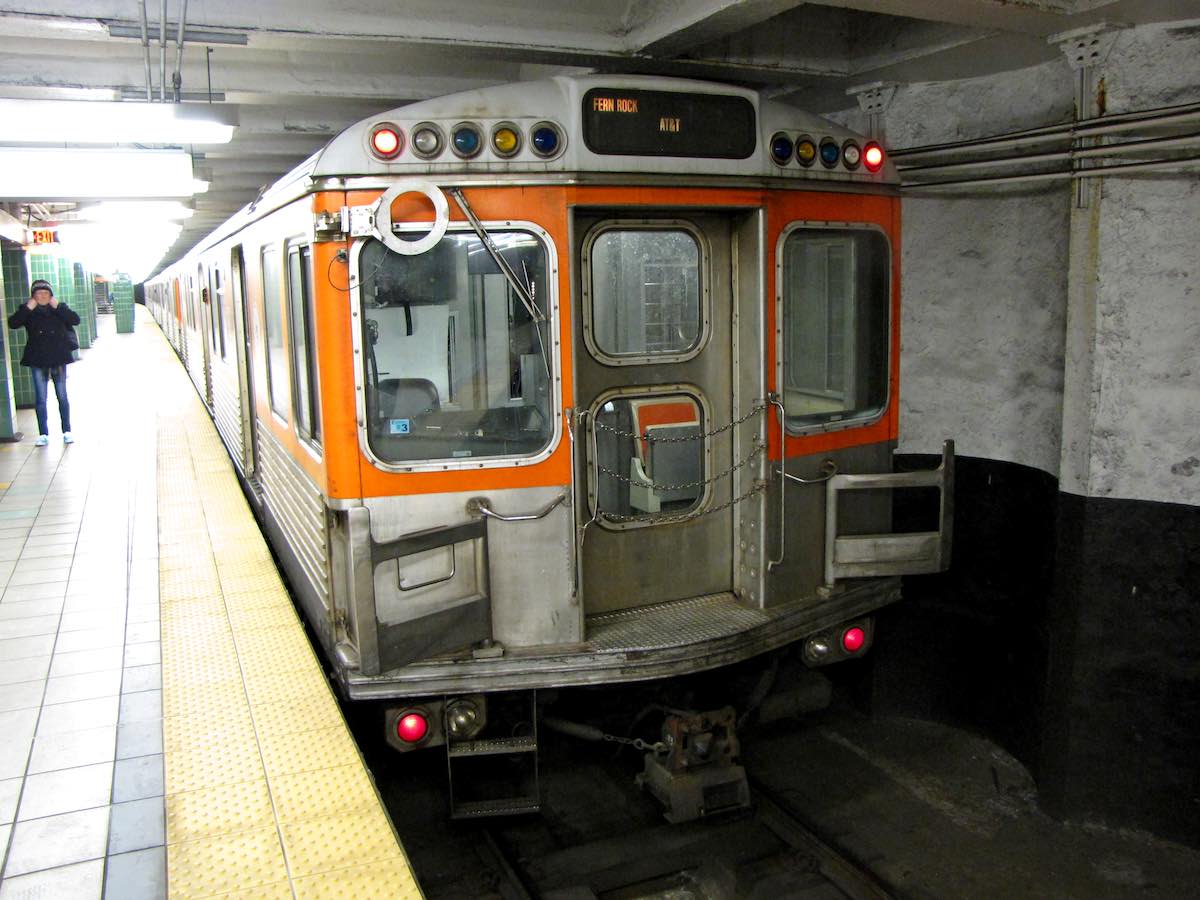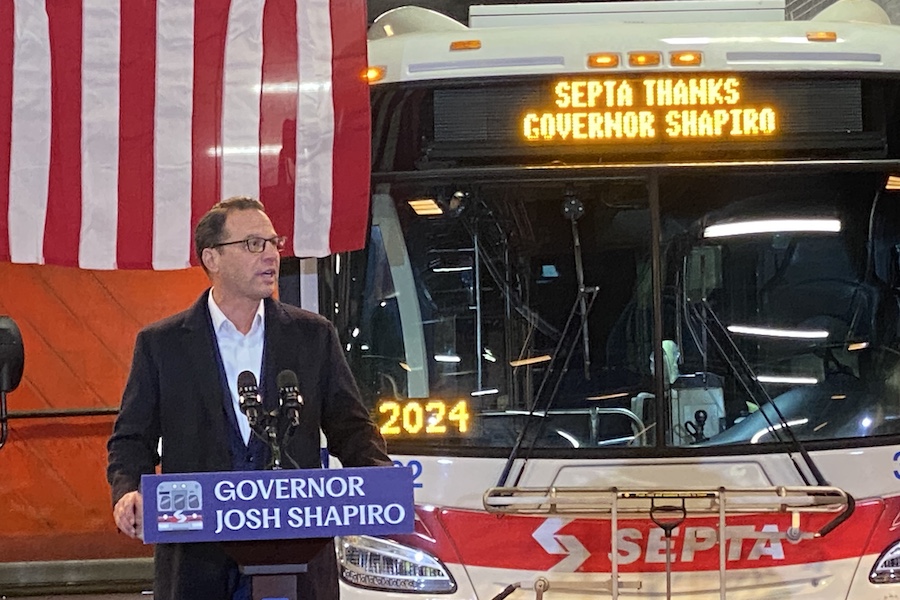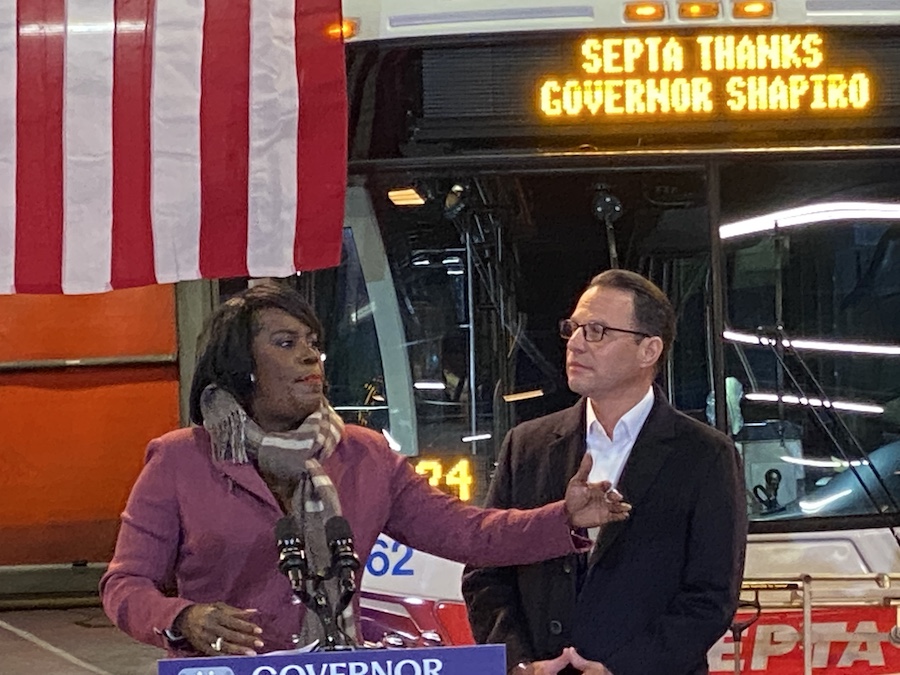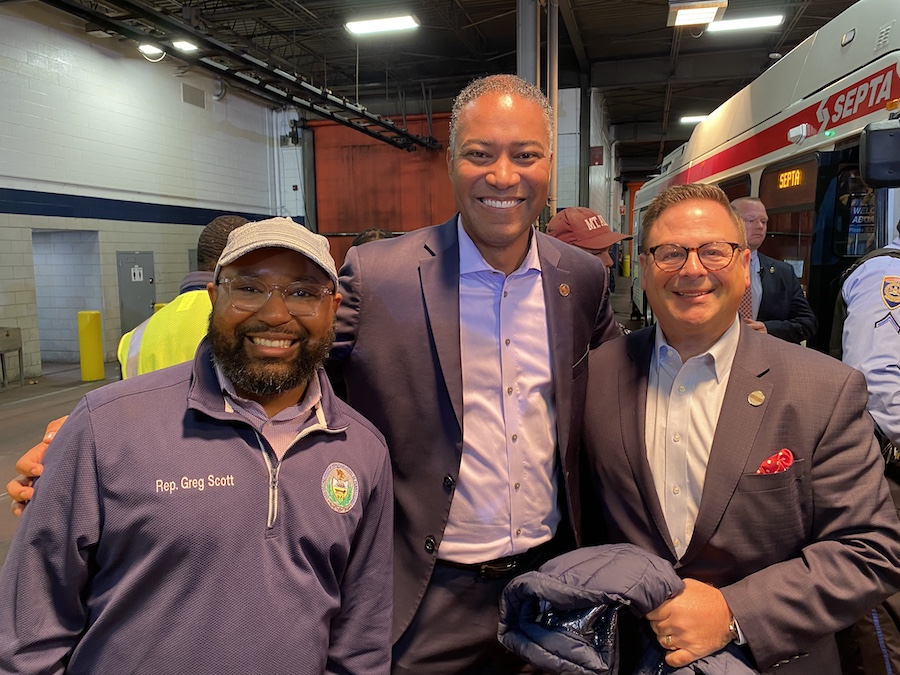Governor Shapiro Throws SEPTA a $153 Million Life Preserver
The cavalry rode to SEPTA’s rescue today and pulled it back from the fiscal cliff.

SEPTA’s buses, trolleys and subways will run as usual for the rest of the year thanks to an infusion of $156 million ordered by Gov. Josh Shapiro. / Broad Street Line photograph by Ben Schumin via Flickr, licensed under CC BY-SA 2.0
Pennsylvania Governor Josh Shapiro announced this morning that he will provide $153 million in funding for SEPTA for the remainder of the fiscal year.
Standing in a bus garage at Frankford Transportation Center in Northeast Philadelphia, Shapiro ordered Pennsylvania Transportation Secretary Michael Carroll to transfer the money from seven highway projects across the state, most of which have yet to be started. The flexed funds will allow SEPTA to call off a planned 21 percent fare hike scheduled to take effect January 1st. The agency can also avoid deep service cuts this spring.
At the news conference, Shapiro touted this action as another example of how he works to “get shit done.”
Along with funding from the Commonwealth, the five counties must also chip in money. Philadelphia Mayor Cherelle Parker announced at the news conference that the city would add $30 million to its SEPTA contribution. Montgomery County Commissioners Chair Jamila Winder said her county would toss another $1 million SEPTA’s way. The other three counties in SEPTA’s service territory will also provide additional funding as the law requires.
Of course, all this merely buys time for SEPTA while Harrisburg figures out a permanent funding fix for public transportation statewide. Shapiro praised the state House leadership for passing his transportation funding package three times this year, but while “not pointing fingers,” he got digs in at the state Senate for repeatedly tacking on additional requests that he would agree to — then failing to pass a bill.

Gov. Josh Shapiro speaks at today’s news conference / Photographs by Sandy Smith
After praising SEPTA’s management, its unions, the police and construction trade unions, and the various elected officials who worked with him to make this happen, Shapiro devoted most of his remarks to the challenge ahead: Making sure that a new steady source of funding makes it into the fiscal 2026 budget.
Like many other big-city transit agencies, SEPTA relied on pandemic assistance funds and additional money supplied by the Inflation Reduction Act to continue to operate service at pre-pandemic levels after ridership crashed. While riders have slowly returned to the buses, trolleys and trains — ridership has recovered to 75 percent of pre-pandemic levels in the two most recent monthly reports — permanent changes in the way people work, especially remote work, mean that ridership will not return to pre-pandemic levels unless new sources of riders arise.
The end of the pandemic money left SEPTA some $240 million short on its fiscal 2025 budget. An infusion of $53 million in state money and local matching funds carried the agency through the fall; the fare hike and future service cuts announced November 12th would have both closed the rest of the gap and put SEPTA on what it called a “doomsday spiral.”

Mayor Cherelle Parker speaks as Governor Shapiro looks on
Several bills passed by the House this year would have averted this crisis, including one that allowed the five Southeastern Pennsylvania counties and Allegheny County to levy their own dedicated sales taxes for transit. None of them made it out of the Senate.
However, Parker offered reason to hope for a different outcome in the coming legislative session: she noted in her remarks that the last time PennDOT shifted highway money to SEPTA, former Philadelphia Mayor Ed Rendell served as governor — and the next year saw the passage of Act 44, the first successful measure to provide dedicated transit funding across the Commonwealth.
It might be worth noting here that both of the chief executives who did this hail from the Philadelphia region. Shapiro noted that the five Southeast counties are the state’s economic engine. While he suggested that this meant the region could figure out how to fund its transit system on its own, it also meant that most of the rest of the state needs tax revenue from the Southeast to fund its road and bridge repair projects — and he also touted the progress his administration has made on those fronts this morning. SEPTA is just one of 59 agencies providing transit service to communities large and small, all of which get some of their operating funds from the Commonwealth.

(left to right) State Rep. Greg Scott (D-Montgomery County), SEPTA Board Chair Ken Lawrence, Jr., and SEPTA boardmember William Leonard
In a news release issued after the conference, the Commonwealth Foundation, a conservative think tank, blasted Shapiro (falsely) for not cooperating with the Senate but also pointed out that SEPTA received an unusually high portion of its operating support from the state. “State funds account for 49.9 percent of SEPTA’s funding,” the release states. “This is disproportionately high compared to other large mass transit agencies.
“The state share for New York City’s Metropolitan Transportation Authority (MTA) is 9.2 percent, for the Chicago Transit Authority (CTA) 26.5 percent, for the New Jersey Transit Corporation (NJ Transit) 26 percent, and for Boston’s Massachusetts Bay Transportation Authority (MBTA) 30.5 percent,” the release reads. The foundation, however, fails to note that at least three of those agencies — the New York MTA, NJ Transit and Boston’s MBTA — are units of their states’ governments rather than independent regional public authorities.
The release also noted that SEPTA gets a lower share of its revenue from fares than the New Y0rk MTA, CTA and MBTA do and that the county governments provide only 7.4 percent of its revenues. While a statewide funding fix is still needed, some of these figures also ought to rise. Shapiro said at the news conference that he has received commitments from the five counties to increase their share of funding for SEPTA.
In addition to Shapiro, Parker and Winder, a parade of elected officials, SEPTA brass and private business leaders spoke at the event, including both state House Speaker Joanna McClinton and Majority Leader Matthew Bradford, State Representative Jordan Harris, Independence Blue Cross CEO Greg Deavens and SEPTA Board Chair Kenneth Lawrence, Jr.
Updated Saturday, November 23rd, at 9:04 a.m. to correct the title of the first statewide transportation funding bill. Governor Rendell signed Act 44 into law in 2007; Act 89, which fixed flaws in Act 44, was signed into law by Governor Tom Corbett five years later. Mayor Parker referred to the latter bill in her remarks at Friday’s news conference.


